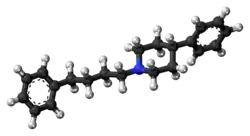_piperidine.svg.png.webp) | |
 | |
| Names | |
|---|---|
| Preferred IUPAC name
4-Phenyl-1-(4-phenylbutyl)piperidine | |
| Identifiers | |
3D model (JSmol) |
|
| ChEMBL | |
| ChemSpider | |
| MeSH | 4-phenyl-1-(4-phenylbutyl)piperidine |
PubChem CID |
|
| UNII | |
CompTox Dashboard (EPA) |
|
| |
| |
| Properties | |
| C21H27N | |
| Molar mass | 293.446 g/mol |
Except where otherwise noted, data are given for materials in their standard state (at 25 °C [77 °F], 100 kPa).
Infobox references | |
4-PPBP is a neuroprotective cyclic amine which binds to sigma receptors.[1]
4-PPBP decreases neuronal nitric oxide synthase (nNOS) activity and ischemia-evoked nitric oxide (NO) production. 4-PPBP provides neuroprotection; this involves the prevention of ischemia-induced intracellular Ca2+ dysregulation.[2] 4-PPBP protects neurons using a mechanism that activates the transcription factor cyclic adenosine monophosphate response element-binding protein (CREB). Neuroprotection that is associated with 4-PPBP increases Bcl-2 expression; Bcl-2 expression is regulated by CREB.[3]
See also
References
- ↑ Yang S, Bhardwaj A, Cheng J, Alkayed NJ, Hurn PD, Kirsch JR (May 2007). "Sigma receptor agonists provide neuroprotection in vitro by preserving bcl-2". Anesthesia and Analgesia. 104 (5): 1179–84, tables of contents. doi:10.1213/01.ane.0000260267.71185.73. PMC 2596726. PMID 17456670.
- ↑ Yang ZJ, Carter EL, Torbey MT, Martin LJ, Koehler RC (January 2010). "Sigma receptor ligand 4-phenyl-1-(4-phenylbutyl)-piperidine modulates neuronal nitric oxide synthase/postsynaptic density-95 coupling mechanisms and protects against neonatal ischemic degeneration of striatal neurons". Experimental Neurology. 221 (1): 166–74. doi:10.1016/j.expneurol.2009.10.019. PMC 2812675. PMID 19883643.
- ↑ Yang S, Alkayed NJ, Hurn PD, Kirsch JR (March 2009). "Cyclic adenosine monophosphate response element-binding protein phosphorylation and neuroprotection by 4-phenyl-1-(4-phenylbutyl) piperidine (PPBP)". Anesthesia and Analgesia. 108 (3): 964–70. doi:10.1213/ane.0b013e318192442c. PMC 2828492. PMID 19224810.
This article is issued from Wikipedia. The text is licensed under Creative Commons - Attribution - Sharealike. Additional terms may apply for the media files.